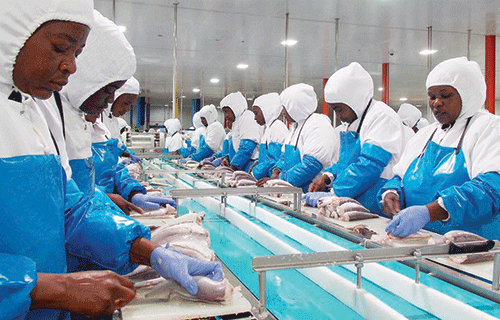A National Coordination Mechanism (NCM) on decent work in the Namibian fisheries sector was launched last week by the labour, industrial relations and employment creation ministry in collaboration with the International Labour Organisation (ILO).
The launch of the NCM marks a significant step forward in ensuring fair labour practices, promoting dialogue among stakeholders, and fostering a more inclusive, sustainable, and resilient Namibian fisheries sector.
The launch event took place on Tuesday, 19 March 2024 at the Protea Hotel — Indongo in Walvis Bay. A Business Forum accompanied the event on advancing decent work in the Namibian fisheries supply chain.
At the event, labour minister Utoni Nujoma emphasised the crucial role of the fisheries sector in Namibia’s economy. He highlighted government’s commitment to addressing key issues affecting the sector, leading to the establishment of the NCM and organising the Business Forum to raise awareness and discuss opportunities for improvement in the fisheries sector.
Nujoma also expressed gratitude to all stakeholders for their support and participation, pledging his ministry’s full support to the NCM in conducting its work effectively.
“The Namibian fisheries industry, a cornerstone of the nation’s economy, employs thousands and significantly contributes to international trade. However, it faces challenges related to decent work, safety, skills development, and issues of illegal fishing. To address these challenges, the NCM has been established to ensure compliance with international labour standards, particularly the Work in Fishing Convention, 2007 (No. 188), ratified by Namibia in 2018,” read a media statement from the acting executive director in the labour ministry, Aune Mudjanima.
The statement added that decent work, not only a moral imperative but also essential for sustainable development, was underscored throughout the event.
“When workers are treated fairly, paid decent wages, and provided with safe working conditions, they contribute more effectively to economic growth and productivity,” Mudjanima stated.
Key achievements and initiatives were highlighted during the launch, including the ratification of international labour instruments such as Convention No. 188, aimed at promoting decent work in the fisheries sector. Additionally, efforts under the Sustainable Supply Chains to Build Better (SSCBFB) project, supported by the European Union (EU) and ILO, were commended for addressing challenges and opportunities in Namibia’s fisheries supply chain.
The NCM, appointed through tripartite nominations, will serve for a period of five years, with a mandate to support and coordinate the full implementation and enforcement of Convention No. 188. This mechanism will consult and make recommendations to relevant ministries, monitor progress, and provide advice to ensure compliance with international labour standards.
“A momentous highlight of the event was the introduction of the NCM members, representing government ministries, workers’ organisations, and employers’ federations. Their commitment to promoting decent work in the fisheries sector was emphasised, with a call to ensure the well-being of workers and enable sustainable enterprises,” Mudjanima added.


